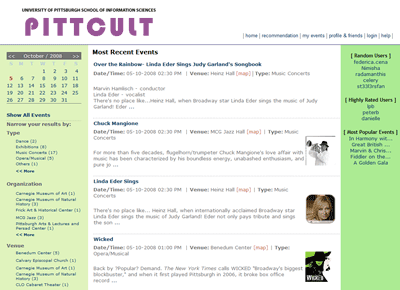Difference between revisions of "PittCult"
From PAWS Lab
(→Link: [http://pittcult.sis.pitt.edu http://pittcult.sis.pitt.edu]) |
|||
| (14 intermediate revisions by 2 users not shown) | |||
| Line 1: | Line 1: | ||
| − | PITTCULT is to share and recommend cultural event information in the Pittsburgh area. This system | + | == Link: [http://pittcult.sis.pitt.edu http://pittcult.sis.pitt.edu] == |
| − | basically utilizes human psychology to conform to opinions of friends. When people go to a music | + | |
| − | concert or exhibition, they commonly ask their | + | [http://pittcult.sis.pitt.edu PITTCULT] is to share and recommend cultural event information in the Pittsburgh area. This system basically utilizes human psychology to conform to opinions of friends. When people go to a music concert or exhibition, they commonly ask their friends' opinions, and invite them to go along. Centered on this trusted human network, users can recommend items to their friends and rate their friends' taste about a certain genre of cultural events. This system is to cope with various problems of traditional collaborative filtering technique such as ad-hoc user problem (users copying other users' profile), data sparsity, blackship users and system scalability. |
| − | on this trusted human network, users can recommend items to their friends and rate their | + | <br/> |
| − | about a certain genre of cultural events. | ||
<br/> | <br/> | ||
| − | [[Image: | + | [[Image:Pittcult.gif]] |
| − | * For more information, please visit [http://pittcult.sis.pitt.edu/ | + | |
| + | <br/> | ||
| + | * For more information, please visit [http://pittcult.sis.pitt.edu/help.jsp here] or contact [[User:suleehs | Danielle Lee]] | ||
| − | * [[Publications]] related with PittCult | + | * [[Publications#PittCult|Publications]] related with PittCult |
Latest revision as of 19:33, 27 October 2009
Link: http://pittcult.sis.pitt.edu
PITTCULT is to share and recommend cultural event information in the Pittsburgh area. This system basically utilizes human psychology to conform to opinions of friends. When people go to a music concert or exhibition, they commonly ask their friends' opinions, and invite them to go along. Centered on this trusted human network, users can recommend items to their friends and rate their friends' taste about a certain genre of cultural events. This system is to cope with various problems of traditional collaborative filtering technique such as ad-hoc user problem (users copying other users' profile), data sparsity, blackship users and system scalability.
- For more information, please visit here or contact Danielle Lee
- Publications related with PittCult

